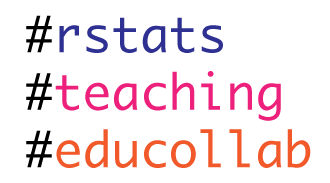Thursday, July 26, 2018 From rOpenSci (https://ropensci.org/blog/2018/07/26/educollab-community/). Except where otherwise noted, content on this site is licensed under the CC-BY license.
At the 5th annual rOpenSci unconference in May 2018, a group of scientists and educators shared their experiences, frustrations, failures, and successes teaching science with R. What came out of this discussion was a framework for rOpenSci Educators’ Collaborative: a community of practice for people interested and engaged in science education using R. This blog post is the third of a three-post series about education and R, written by this group of unconf18 participants. Read the first post about common pedagogical challenges here, and the second post about what makes a good open educational resource here.
tl;dr: we propose three calls to action:
- Share your curricular materials in the open.
- Participate in the rOpenSci Education profile series.
- Discuss with us how you want to be involved in rOpenSci Educators’ Collaborative.
In previous posts in this series, we identified challenges that individual instructors typically face when teaching science with R, and shared characteristics of effective educational resources to help address these challenges. However, the toughest challenges that educators in this area face are human, rather than technological. Our shared experiences highlight the need for a strong community of innovative R educators. However, this community is currently not well-connected or easily discoverable.

In this final post, we propose a framework for developing an rOpenSci Educators’ Collaborative: a community of practice for people interested and engaged in science education using R. A community of practice is defined as a group of skilled practitioners who share a common passion, and who learn how to do it better by interacting with each other regularly. To develop this kind of community, we need to go beyond shared domains of interest in R and education. Here, we’d like to invite educators to join us in discussing how to put the other ingredients in place.
First, we need a community, a place to share information and build relationships. It is important to note that while we recognize (and envy!) The Carpentries and the strong education community of practice that has been developed around their workshops for teaching foundational coding and data science skills, we believe there is a place for a community of science educators who teach with R, but who may not identify as someone who teaches coding or programming skills. Currently, one of the main challenges for these educators is the availability and discoverability of course materials. There is an abundance of tutorials and a lack of curricular resources. For example, there are many individual tutorials, focused workshops or bootcamp materials, online courses, and lesson plan modules. All of these are great resources, and can be integrated within a long-form course curriculum. However, while it is helpful to leverage existing materials, adapting these materials in the classroom still requires preparation time. To use them successfully, educators usually need to think carefully about the dependencies of each individual resource (i.e., packages used, assumed prior R knowledge, assumed content domain knowledge), and how it fits into the larger temporal sequence of course materials and learning objectives. It also can be difficult to teach a class or lead a lab-based on others’ materials, written in someone else’s voice, and educators typically need to adapt the data or code to better meet their class’ needs or skill level.
On the other hand, there is a lack of integrated long-form resources, where educators share full-length syllabi along with R-based learning materials. There are many reasons why these materials may not be open: lack of instructor confidence in sharing their teaching materials, lack of knowledge about tools and platforms for public sharing, and lack of support from institutions and departments. We would like to invite educators to begin to share their curricular materials, and offer a few recommended resources:
- Humanities Commons
- Open Science Framework
- GitHub repository with recommended topic tags
teachingandrstats. (Sample search)
Even if they are made open, the problem remains of how to discover their availability; current methods tend to be time-dependent like sharing links in tweets or posts on community forums. If stored in a GitHub repository with the teaching and rstats topics added, one can search GitHub for these topics: currently there are 27 of them!

To address this larger challenge, we propose a new rOpenSci Education profile series, which will include interviews with practicing educators to share their own resources, tools, strategies, and experiences in the classroom. We hope that beginning this dialogue about education with educators will be the beginning of an rOpenSci Educators’ Collaborative. We hope that this collaborative will provide a space for new and experienced educators to share what works and what doesn’t. Ideally, in the words of one expert, this community of practice would work to “develop a shared repertoire of resources: experiences, stories, tools, ways of addressing recurring problems.”

